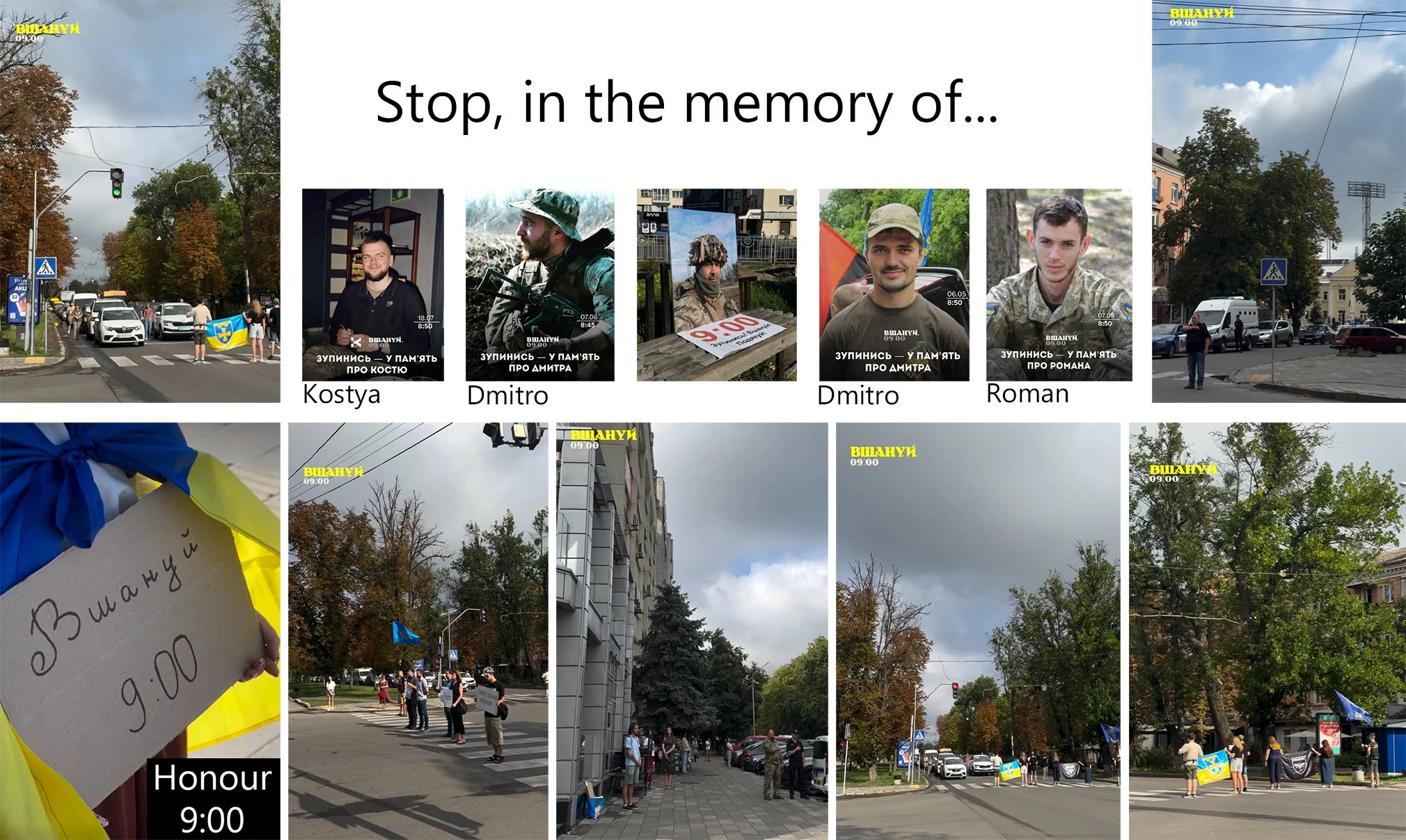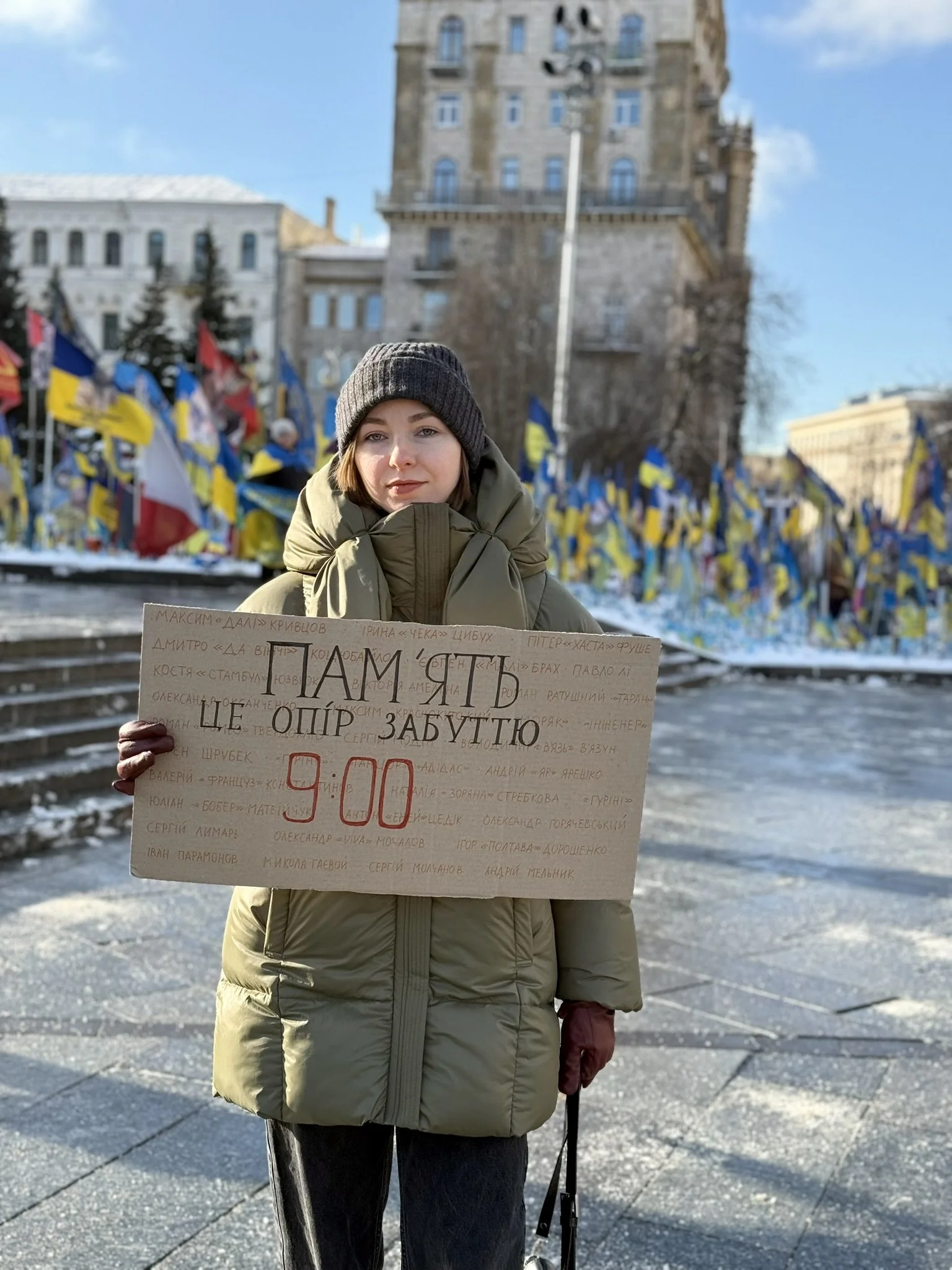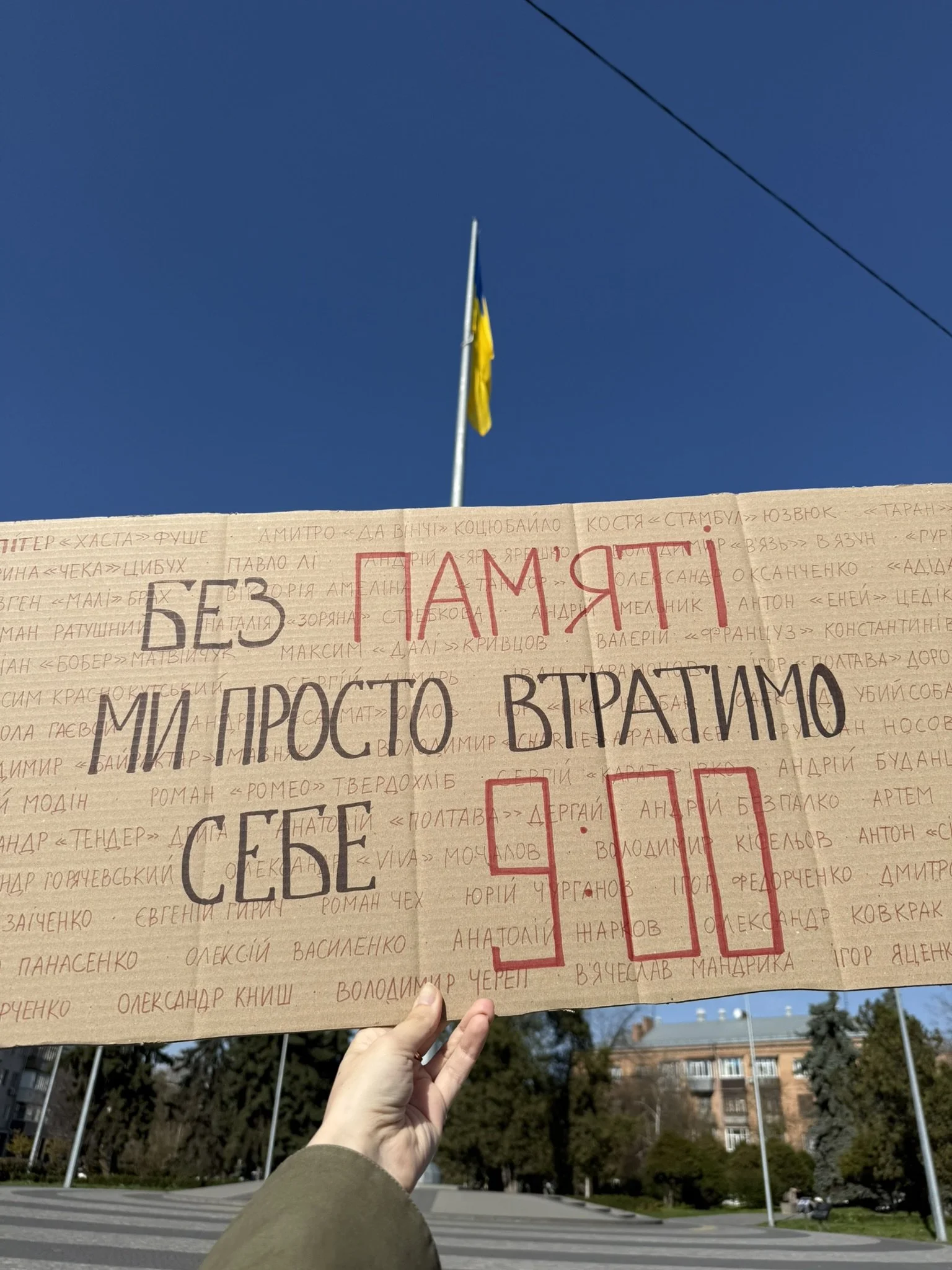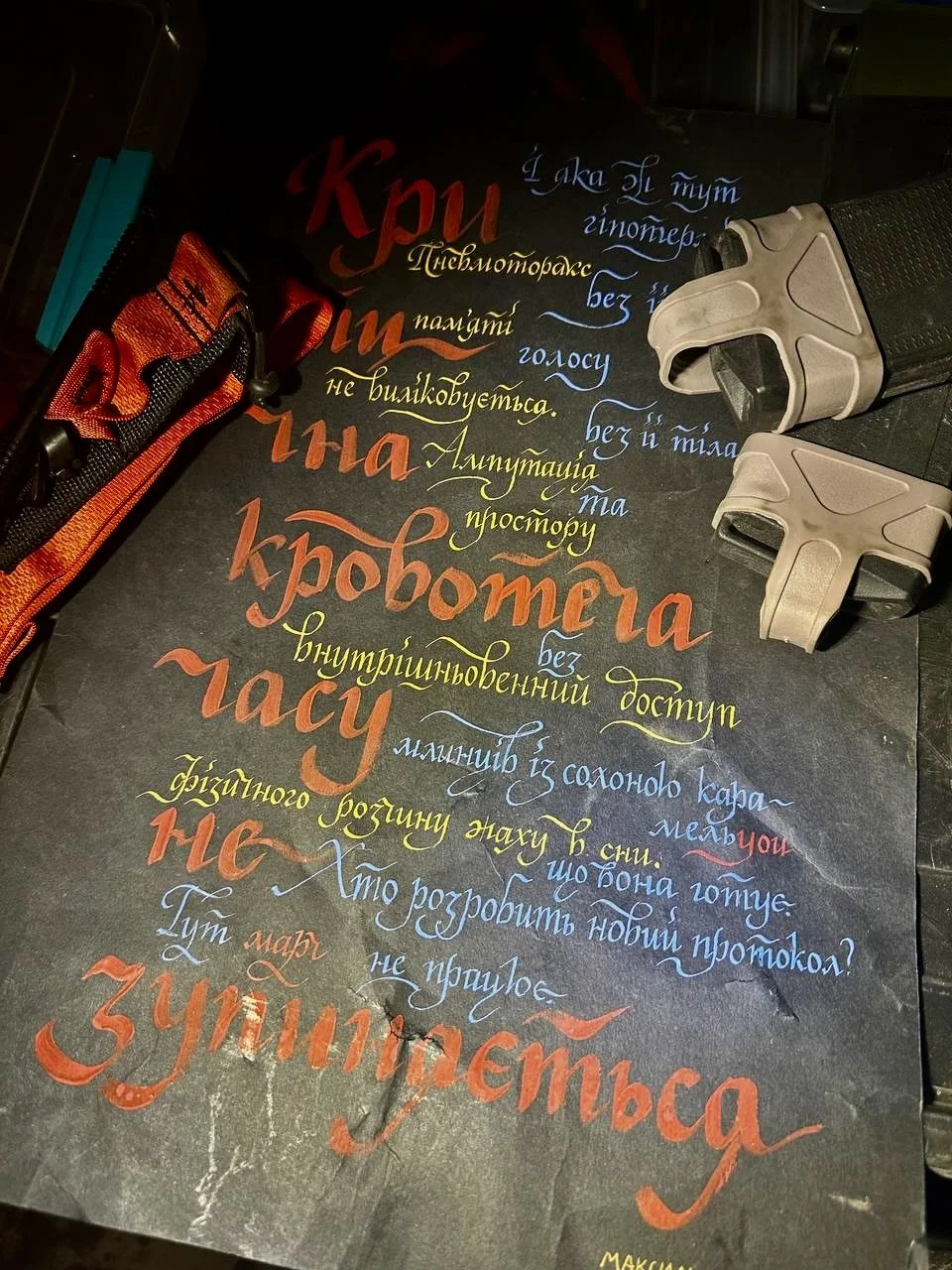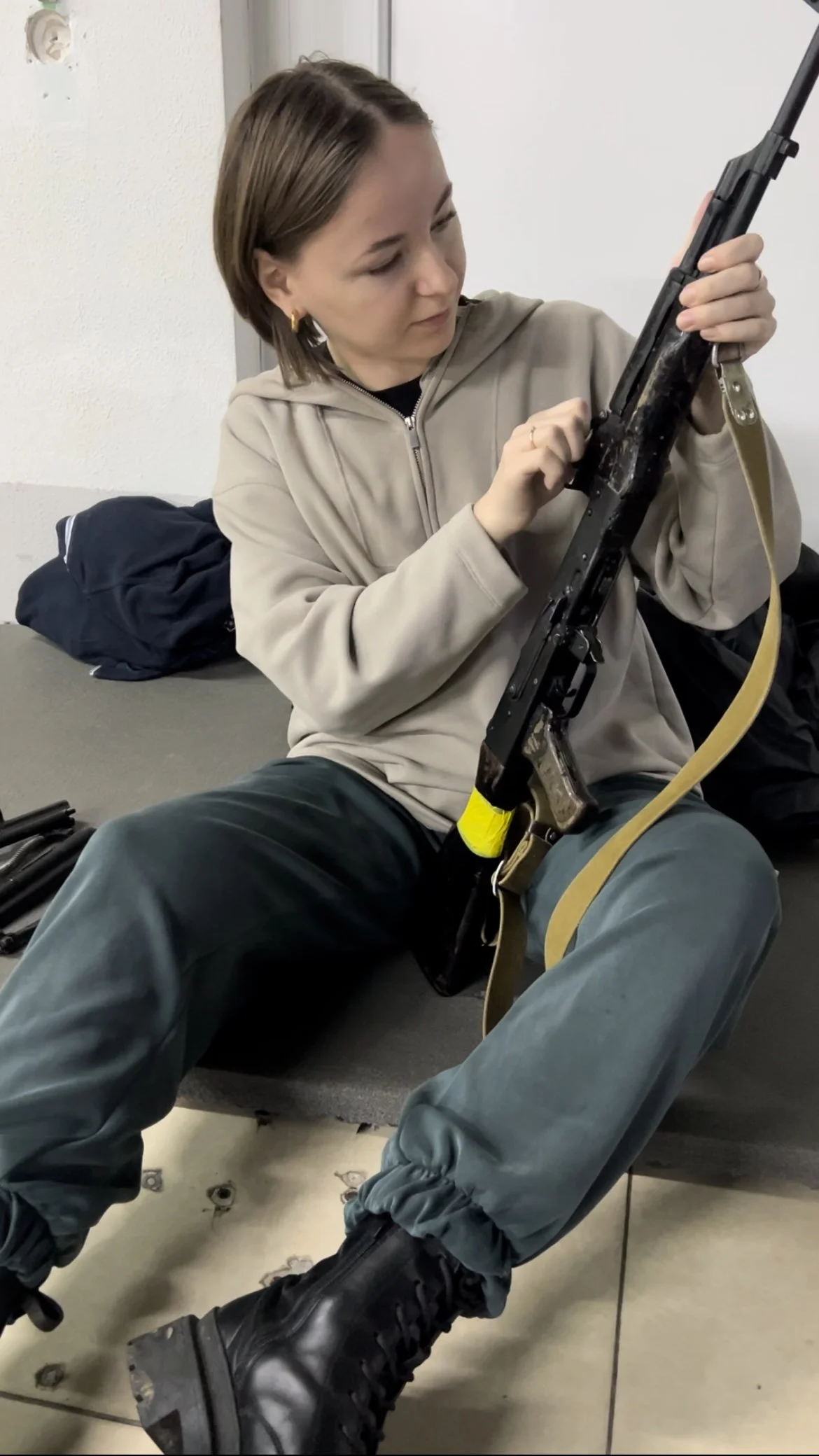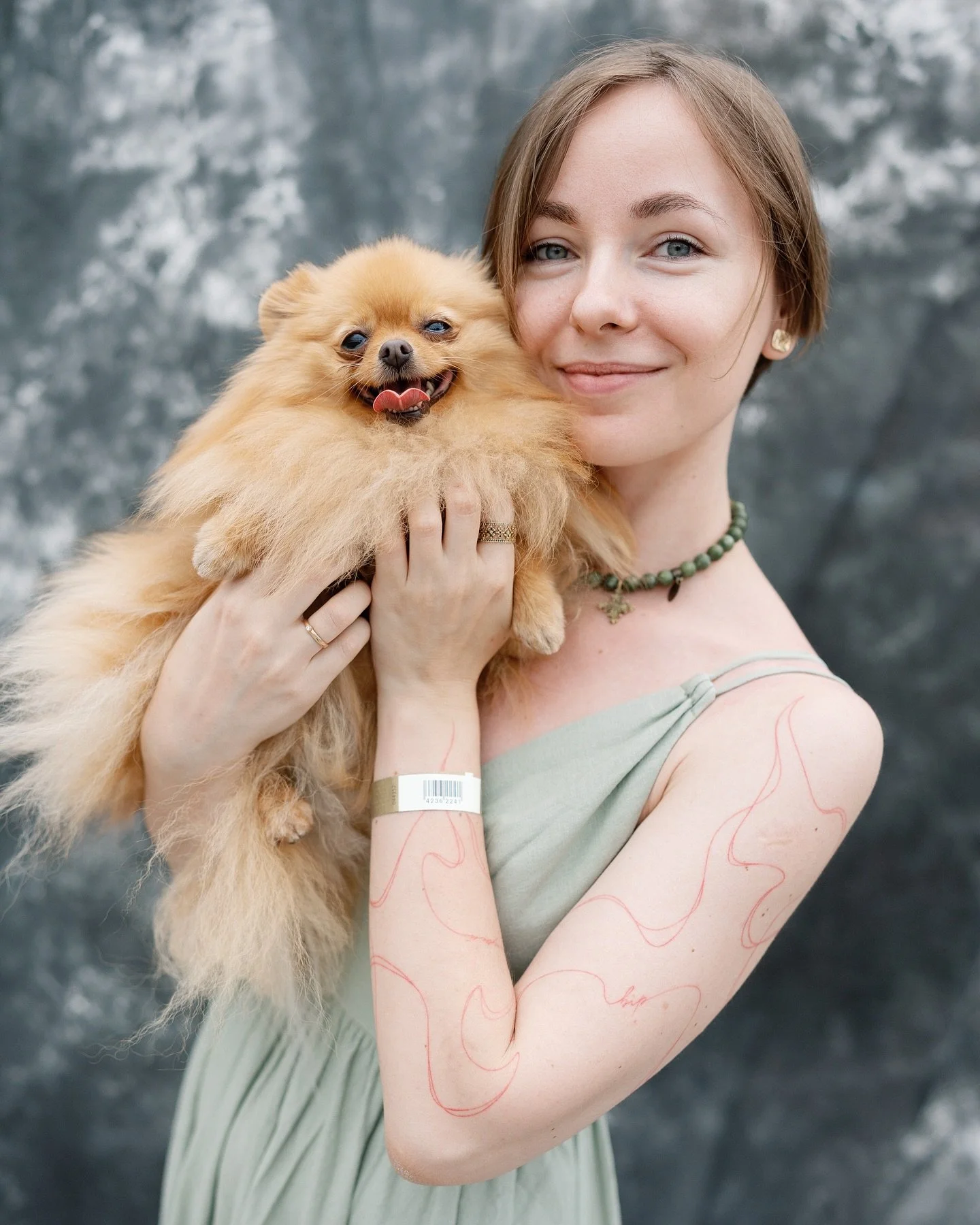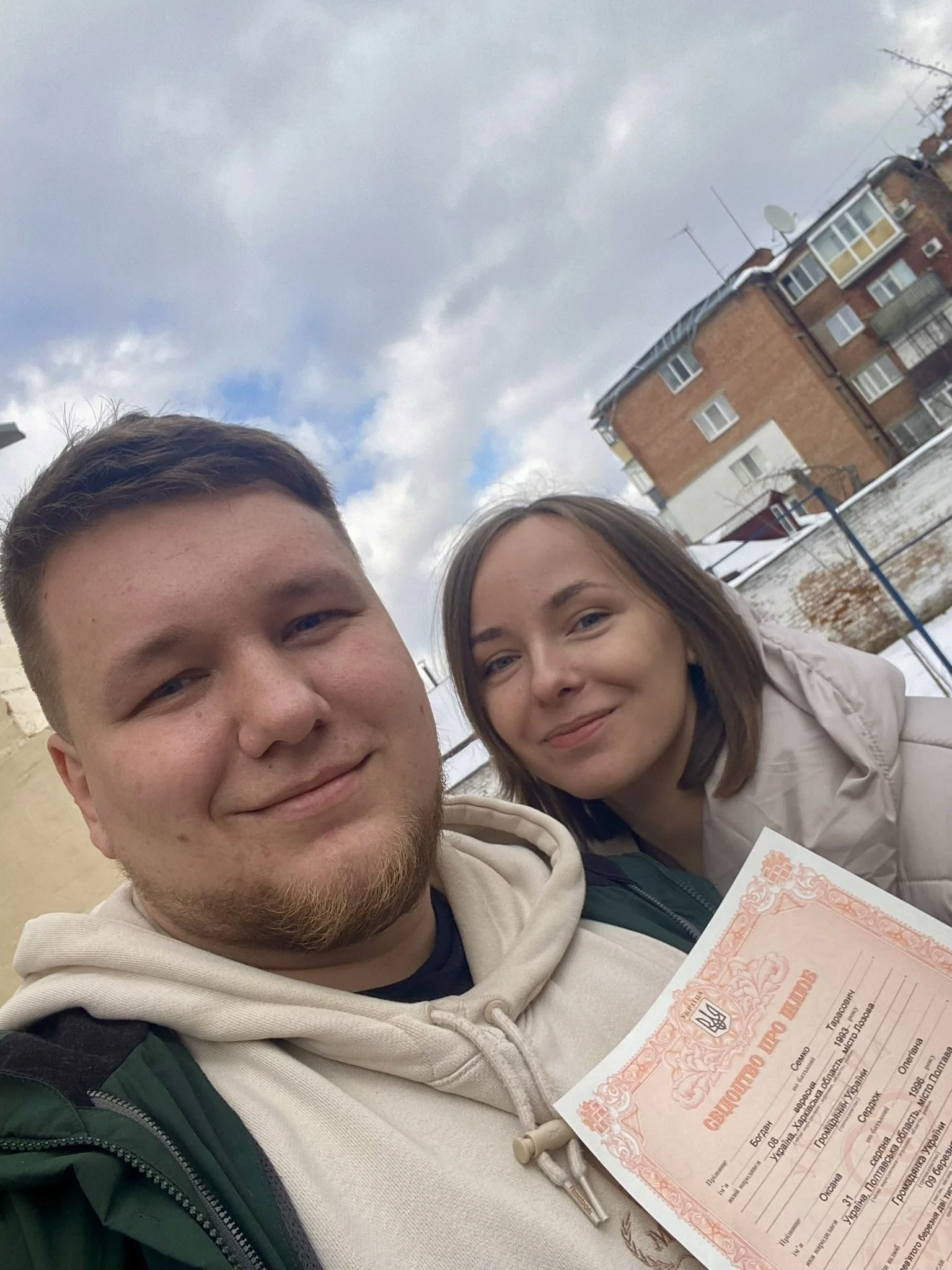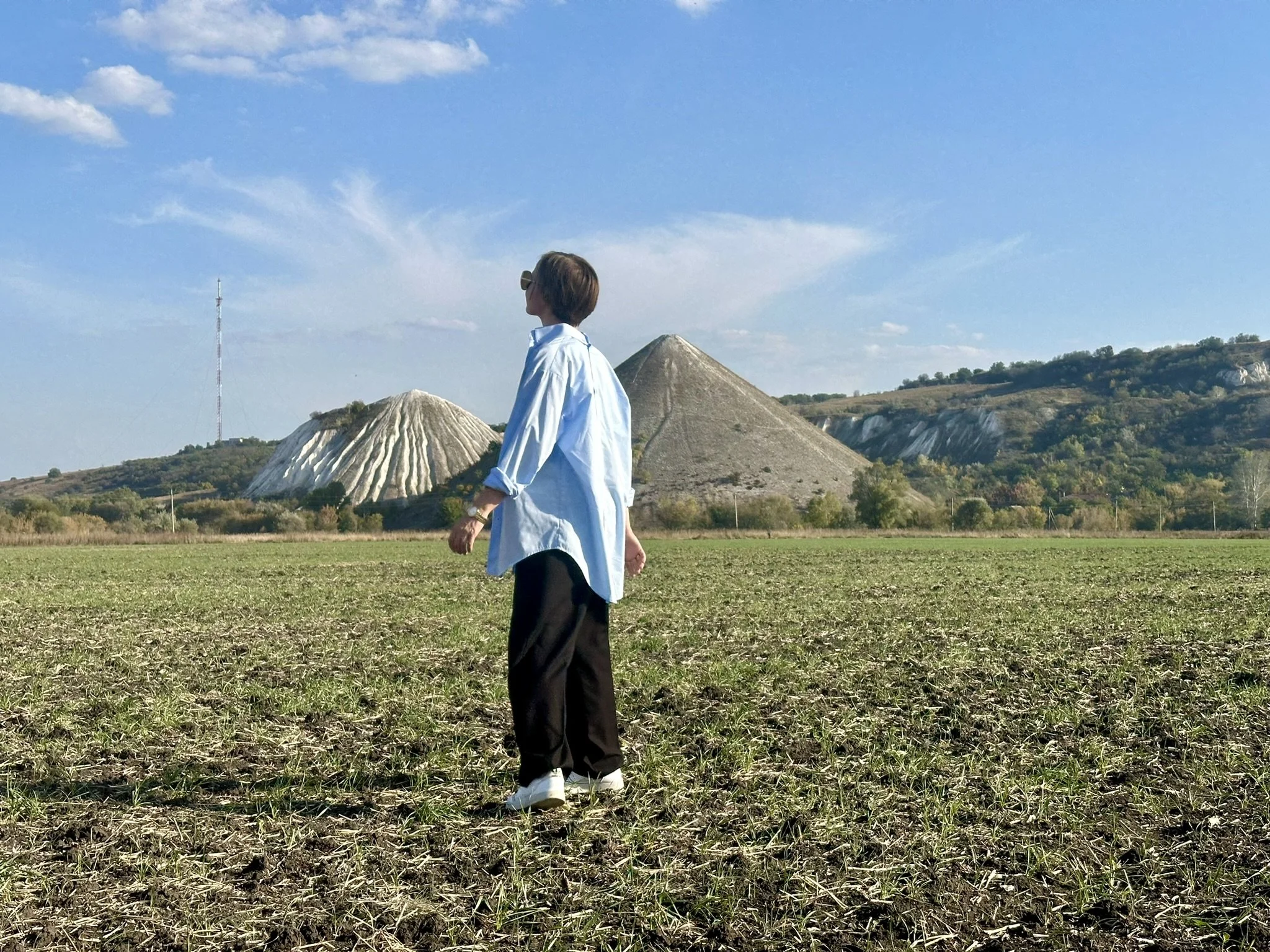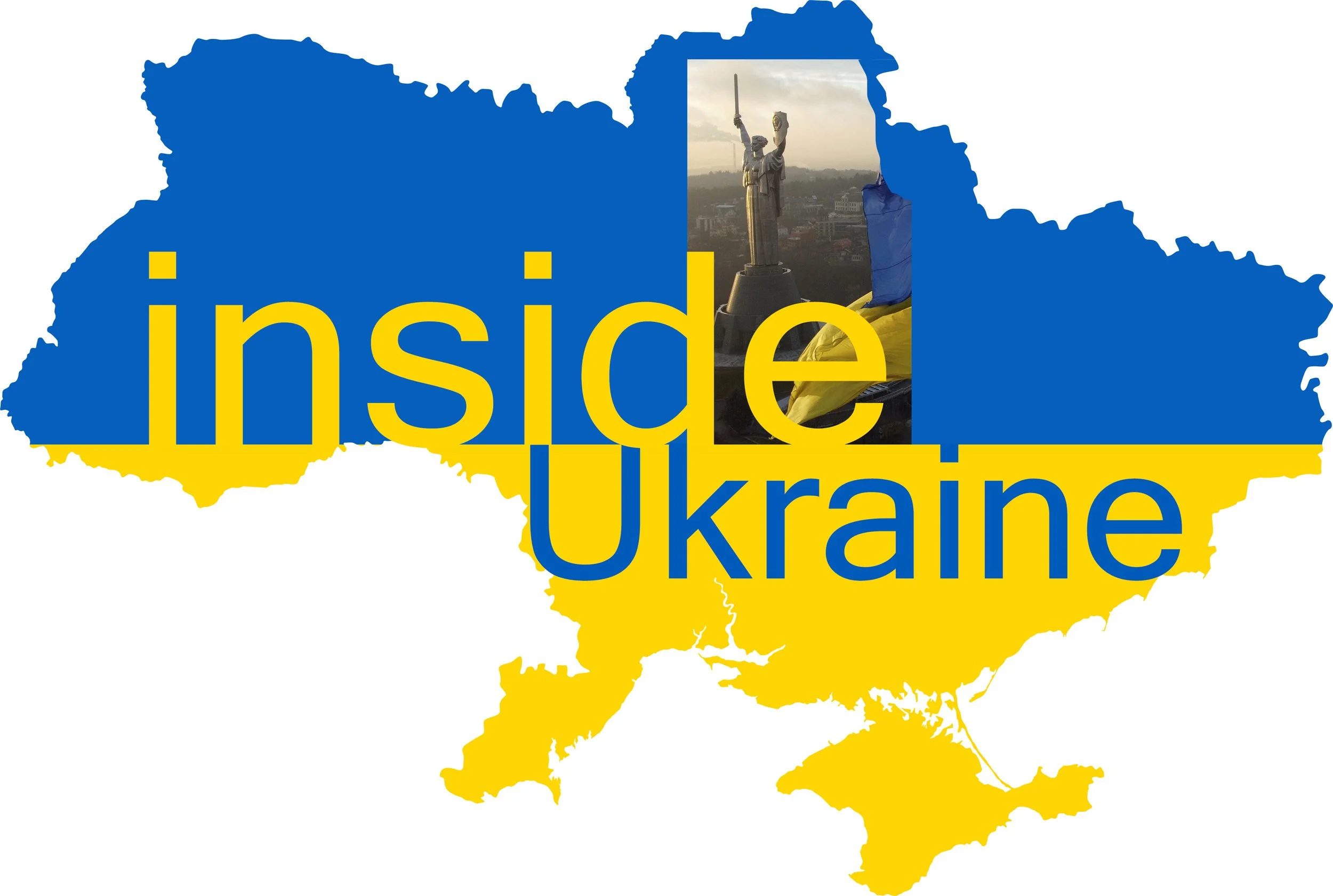THIS INSIDE UKRAINE STORY IS FROM Poltava.
* All images and answers in the feature were provided by the WOW Woman, unless otherwise specified.
INSIDE UKRAINE SERIES: A SNAPSHOT, A DAY-IN-THE-LIFE, A GLIMPSE OF WHAT IT’S LIKE TO LIVE, RESIST, SURVIVE AND PERSEVERE IN A NATION UNDER ATTACK.
GLORY TO THE UKRAINIAN WOW WOMEN, who fight for freedom AND BRING UKRAINE CLOSER TO VICTORY.
Oksana Semko, a software engineer from Kharkiv, never planned to also become a volunteer coordinator or wartime organizer — but when russia invaded, she stepped forward. Kharkiv, 19 miles from the russian border, was shelled daily. Although in Poltava now, and 75 miles from the front line, russian threat remains ever-present for Oksana and for millions across Ukraine. Ukrainians receive non-stop alerts about russia's daily drone strikes and indiscriminate ballistic missile attacks.
Oksana resists the aggressor daily by volunteering, fundraising, and continuing to strive for a better future. She also found ways to make a difference in Ukrainian society - she is part of the team who organizes remembrance events in Poltava for the fallen Ukrainian defenders. “It’s just one minute in a whole day, when Ukraine can unite in gratitude to our heroes — to remember by name the friends and loved ones we’ve lost, to ask ourselves, ‘What can I do today to be worthy of their sacrifice?’ Most importantly, this is the simplest action that can help us carry this memory across generations. So that our grandchildren remember the price of independence.”
Oksana and millions of women across Ukraine are demonstrating the commitment to carry both memory and responsibility every day.
- Olga Shmaidenko, Founder of WOW Woman. Inside Ukraine is a WOW Woman series documenting the voices of Ukrainian women during the full-scale russian invasion. It bears witness to the human cost of war and to Ukrainian women’s refusal to be silenced.
Software Engineer, Memory Keeper, PoltavA
1. Name
Oksana Semko.
2. Where were you born and where do you live now?
I was born in Poltava, Ukraine, and lived there until I was 17. I then moved to Kharkiv to pursue my studies.
After graduating, I found a job in Kharkiv and lived there for nine years. However, in 2022, with the onset of the russian invasion of Ukraine, I returned to Poltava with my husband. This is where I reside now.
3. What did you study, and what is your current profession?
I obtained a degree in Software Engineering and have been working as a developer for nine years now.
4. What did your typical day look like before the full-scale war, and how did your life change after the invasion of Ukraine? What is your typical day like now (if that’s even possible)? Where were you and how did you learn/feel the start of the russian offensive? What challenges did you face after the invasion?
Before the full-scale invasion, my husband and I led a happy and normal life in Kharkiv. Six months before the invasion, he proposed, and we were actively planning our wedding. At that time, we also purchased our first apartment in Kharkiv on installment. No one believed that a large-scale war could actually begin.
My typical day was like everyone else’s: I worked from home, occasionally went out with friends, and I especially loved going for coffee and walks in Kharkiv’s parks with my husband — those moments were simply incredible.
A few days before the invasion, there were rumors circulating about something coming on the horizon. Many IT companies began offering their employees the option to temporarily work from abroad. But we categorically refused to believe that a full-scale russian attack was possible. We didn’t even have an evacuation bag packed and ready. Although, a couple of weeks before February 24, my husband had been in Lviv and witnessed military equipment being moved. Only later did we understand that it was being transferred eastward not just for maintenance or repairs.
On February 24, 2022, early in the morning around 6 a.m., we were woken up by a phone call from my husband’s mother who lives in the Kharkiv region, closer to the russian border. He picked up the phone and after first few words, he stepped out onto the balcony where explosions were clearly audible. The war had begun.
Surprisingly, I didn’t panic. For some reason, I had a feeling that something long overdue had finally happened. I understood that now we needed to gather ourselves and do what was necessary. We immediately drove to the gas station near our home, where a line had already formed. While we were outside, we already heard the sounds of explosions. It felt like some kind of parallel reality. We stood in line at the store for food, then needed to find a place to withdraw cash because we had almost none. Then we immediately went to the blood donation center, which already had a line as well. My husband donated blood, but he forbade me from doing so — in case something happened, I needed to have the strength to drive.
We spent the next week glued to our phones. I tried to work at least a little — our jobs hadn’t been canceled. Our building had walls 1.5 meters thick, and we hoped that offered at least some protection. I might have stepped outside once or twice during that whole week. My husband went out for groceries, stood in huge lines, and clearly heard strikes hitting the city. We lived in one of the central neighborhoods, and thankfully there were only a couple of direct hits near us during that week.
I was shocked by the reaction of russians to the invasion. I had an old contact with a man from russia. I had once interviewed him for a position at our company. He wasn’t hired, but we stayed in touch. After the full-scale invasion began, he decided to write to me — to tell me how he was doing and say that “our guys will bring order over there.” We argued for a long time, and I heard every single propaganda narrative out there — about NATO bases in Ukraine, about the “Anglo-Saxons” who supposedly control Ukraine.
And this was from a person who works in IT, meaning he’s relatively well-off, should be educated, and could very well have worked at our company. The myth that only poor people in russia support the regime and its propaganda was immediately dispelled for me. There are millions of people like him over there.
During that first week, all of our friends kept telling us to leave the city, but we didn’t dare. On one hand, there were rumors that civilian convoys were being shot at while trying to leave the city, and we thought it was safer to stay put for now. I don’t know whether that was the case in Kharkiv, but in Kyiv — it absolutely was. Hundreds of cars were shot at along the Zhytomyr highway, passengers and all. Plus, we believed that surviving in a big city would be easier than in a small one. We didn’t yet know what, for example, was going to happen to Mariupol.
But after a week, the tension peaked. We finally packed a suitcase, picked up my cousin and her kids, and left for Poltava.
We’ve been living here ever since. After we recovered a little from the trauma, we went to the civil registry office and officially got married. It was clear we likely wouldn’t have a wedding that summer, and in case something happened — it was better to have a legally recognized marriage.
At first, we lived with my mom — the three of us. Later, my mother-in-law joined us when there was a threat that her town might be attacked, and then my husband and I moved into a separate apartment.
The best thing that happened during this time was getting our dog, which we adopted in April. I had dreamed of having a dog for many years, and the war showed me that there’s no point in waiting — tomorrow might never come. That little sunbeam has brought us so much comfort, especially me.
In 2023, I visited my husband several times in Sloviansk, in the east. These two photos — with the Donetsk slag heaps in the background and the sign at the entrance to the city of Lyman — are very meaningful to me.
Photo with the Lyman city sign.
This selfie was taken right after we registered our marriage at the civil registry. We did it all in one day — brought our documents in the morning and had our marriage certificate by lunchtime.
Since March 2023, my husband has been in the military. During our time together, we were almost never apart — we were always together. He was my pillar and support. And suddenly, that support was gone. It was incredibly difficult for me to start living on my own, to solve my problems alone. I really lacked understanding from loved ones, and I didn’t have close friends nearby at the time. A support group for military wives run by Veteran Hub became a lifeline for me. I found like-minded women there, friends whom I’m still close with to this day.
We had postponed our wedding celebration for three years. We wanted to hold it after the victory, but in 2024 we realized anything could happen, and there might not be a better time. Besides, since 2021 we had already paid deposits to all the vendors and bought the wedding dress. So we had our dream wedding with our closest people. And our dog brought out our wedding rings, dressed in a stunning white dress. Here’s Busia running toward us with the rings.
The next day we held a wedding celebration with traditional Ukrainian customs for our nearest and dearest. We ordered a korovai (ceremonial bread) from a grandma who has been baking it for decades using old customs. We performed rituals, sang songs, learned traditional Ukrainian dances and games. In this photo, our mothers are tying our hands with a rushnyk (embroidered towel) as we take our seats at the festive table. Then we pull our hands out, leaving a knot tied until the end. That knot is a symbol of our strong marriage — it should never be untied.
5. What do you consider to be your strengths or superpowers?
It’s hard for me to talk about my strengths because I’m overly self-critical. Maybe my superpower is that when something interests me, I dive into it 120%. That’s how I’ve now become completely immersed in volunteer work. But there’s a downside to this too — sometimes I get so carried away that I might miss a detail or rush something too much.
Friends have told me that I’m goal-oriented, empathetic — maybe that’s true.
6. What specific actions (big or small) have you taken and continue to take to help Ukraine and the Ukrainian people?
At the start of the full-scale invasion, there was a major shortage of medicine in Kharkiv. Logistics hadn’t yet caught up, and medications were scarce. So for the first month, I drove around Poltava’s pharmacies, bought medications, and sent them by mail. This was coordinated with my colleagues.
Of course, I’m constantly donating money to various fundraisers. I have monthly subscriptions to a few foundations for fixed amounts — this helps the larger organizations better plan their purchases.
When my husband went into service, a lot of expenses went into his gear, clothing, etc.
I also organized fundraisers of different amounts — from 3,000 to 100,000 UAH — to cover the needs of my husband, acquaintances, and friends. Over time, from what I’ve noticed, fundraising is getting much harder. There are more and more appeals, and people have less and less money. People get tired, they move abroad, they start forgetting about the war. But when a big tragedy happens — like recently in Kryvyi Rih or Sumy — Ukrainians suddenly mobilize and start donating again. This isn’t necessarily bad, but of course, it would be better if people donated regularly. The military has needs every single day.
My early fundraisers were closed very quickly and easily. Now, you really need to interest people, trigger an emotional response, tell a story — so that they choose to donate to you specifically.
In Poltava, there are regular rallies in support of russia-held Ukrainian prisoners of war and missing persons. I consider it my duty to attend these rallies, and I try to go to each one. It’s important for several reasons. First, it’s a huge support for the families — they understand that they’re not alone, that these events give them a way to do at least something in their helpless situation. Second, the rallies remind Ukrainians about those still in captivity, and that captivity is hell and torture. Third, imagine our heroes returning from captivity, where they’re told that they’ve been forgotten, that no one needs them — and then seeing these rallies, seeing that they’re awaited, that people are fighting for their return. That alone is worth all the effort.
For the past few months, I’ve been involved in a new activity that takes up most of my free time. I feel like I’m doing something extremely important — something that will matter even after the war ends. And that is reminding people in Poltava about memory.
In January of this year, I joined the NGO “Honour/Vshanuĭ” as one of the coordinators in Poltava. This organization was founded by the heroine Iryna Tsybukh, who popularized the culture of remembrance and the Minute of Honor (that’s what she called the moment of silence). For quite a while now, remembrance rallies have been held across Ukraine, but none had taken place in Poltava. One day I found the courage to message them on Instagram about organizing such actions in Poltava. Luckily, by some magical coincidence, two other girls had separately reached out to “Honour/Vshanuĭ” at the same time. That’s how the three of us ended up in one group chat and became co-coordinators of these rallies in Poltava.
The actions take place every Wednesday and Saturday. Usually, the three of us are joined by 3 to 7 other people. Each time we choose a new location, taking into account foot traffic and the number of cars usually passing through that area.
At 8:59 a.m., the police stop traffic at the intersection. We play an audio announcement over a speaker explaining that a National Moment of Silence is beginning. We ask everyone to stop what they’re doing, pause, stand up if possible, and ask drivers to get out of their cars — to remember all the soldiers and civilians who have died in this war.
During our actions, most people do stop. However, if we don’t have a speaker with the announcement or if there’s no police presence, unfortunately, very few people react. But we believe that over time, we’ll get through to people. There are examples in other cities (Lviv, Myrhorod, Vinnytsia) where the city pauses at 9:00 a.m. on its own, without reminders.
Ukrainian poet Maksym Kryvtsov once wrote: “War is names.” And we try to show the people in our city that we must remember those who gave their lives for our independence. Their memory is a part of us. On this poster are the names of those who fought for us and were killed by russia. These photos are from one of our Moment of Silence remembrance rallies in Poltave.
It’s just one minute in a whole day, when Ukraine can unite in gratitude to our heroes — to remember by name the friends and loved ones we’ve lost, to ask ourselves, “What can I do today to be worthy of their sacrifice?”
Most importantly, this is the simplest action that can help us carry this memory across generations. So that our grandchildren remember the price of independence.
We’re also working with businesses and the public — helping implement the Moment of Silence, talking about the importance of memory. The way we remember the events of the past directly affects who we are today. And today’s events will shape our grandchildren and great-grandchildren. So we carry the responsibility for how the story of this war and the actions of our heroes will be retold in 10, 20, 50, or 100 years.
7. How do you take care of yourself? Is it even possible to stay mentally stable during war? What helps you pull yourself together?
I believe that right now, I’m absolutely stable. But I went through a long journey to get here. First and foremost, it was personal psychotherapy and self-work. Just as important was building a circle of communication with people who share my values. Going through all these emotions alone, without support, is very hard. So it’s good to have someone with whom you can exchange support. I can also add some basic things like sleep, regular workouts, and a variety of types of rest.
For more than two years now, I’ve been practicing calligraphy. I discovered it a few months after my husband’s mobilization. For me, it became a kind of meditative practice that helped regulate my emotions. Beyond my personal practice, I make cards and write name tags in exchange for donations to current fundraisers. I’ve also held several calligraphy workshops for donations, and one free workshop for veterans and their families. On the right, this is my piece inspired by the poem by Maksym Kryvtsov: “Critical blood loss of time doesn’t stop…” This poem touched me deeply, and I created a calligraphy piece based on it to complete one of my courses. Symbolically, this piece has already traveled to different parts of the frontline — in my husband’s vehicle. And the marks of time only add to its value. Kryvtsov, a machine gunner, poet, and photographer, was killed on January 7, 2024 aged 33, while defending his country. He was killed as a result of a russian artillery strike on his position in the Kharkiv region.
8. Do you feel that the war has changed you? In what way? Were you surprised by yourself (how you held on, stayed strong, found inspiration in unexpected places, etc.), by your country, by your ideas about humanity, your attitude toward the world? What was an eye-opener for you?
I feel that all the events of these past three years have changed me. The mobilization of my husband especially affected me — I learned to be more independent, more proactive, to act. Now I’m not afraid to show initiative and to stand my ground if I feel strongly about something.
My entire circle has changed completely. First, I met the wives of military servicemen — two of whom are now my closest friends. When I started going to the remembrance rallies for POWs and the missing, I began building new connections with people who share similar values. It’s inspiring — to see that there are people around you who care.
9. What do you want the world to know about Ukrainians at this moment in time? About Ukrainian women?
I would like the world to know the historical context. That Ukraine is a country whose origins date back thousands of years, and is now fighting to be fully independent.
This war isn’t only about our country. It’s about global democracy and security. Because if russia doesn’t get punished, it will move on. Regardless of whether putin is still in power or if someone else takes over.
10. Which WOW-women inspire you?
I’m inspired by the women around me. Those who keep moving forward no matter what, who aren’t afraid to take on responsibility, who work and change the world for the better — even if it’s just in their immediate surroundings.
11. What place or activity makes you happiest?
What makes me happiest is my husband and the time we spend together. Also — when I feel that I’m doing something meaningful for my country.
12. What’s the first thing you’ll do when Ukraine wins? What do you dream of for yourself and your family after the war ends?
After the full-scale invasion began, the Serhiy Prytula Charity Foundation began opening Civilian Readiness Centers across cities, where experts conducted vital trainings, including tactical first aid and weapons handling. Naturally, I felt it was essential for me to learn these skills. In this photo, I’m training to disassemble and reassemble a rifle.
To be honest, I stopped dreaming about victory a long time ago. Because “victory” is something abstract… When will it happen? On what terms? There are so many important questions with no answers.
Of course, I would want the liberation of all Ukrainian territories to the 1991 borders, the release of all prisoners (both military and civilian), and reparations. But considering the latest political developments, it’s hard to believe that’s possible. So I simply dream that my husband will come home, alive and healthy, that we’ll find our dream home, and that we’ll continue building our family and our country.
13. In your opinion, how are russians as a people different from Ukrainians? Did we know about these differences before the full-scale war? Were we in denial?
I think that before 2014, no one really thought about this difference. During the war in Georgia in 2008, I was 12 years old, and I either didn’t hear about it at all or just didn’t pay attention — until around the age of 20.
Aside from the media, which perhaps didn’t cover the events thoroughly back then, it’s also my own fault — I wasn’t interested in politics, I was comfortable as I was.
Now I’m able to reflect on that difference. I notice the narratives that were once popular about Ukrainians — how we were portrayed as dumb, naive peasants who only love salo and varenyky.
It’s only now that I’m learning about great Ukrainian artists and scientists who were either claimed by russia as their own or destroyed because they were pro-Ukrainian.
Look at how many peoples are currently a part of russia — both legally and psychologically. All of them were once occupied just like Ukraine. But somehow, only Ukraine has retained its independence — geopolitically and in its mindset.
Even just looking at the Revolution of Dignity, we can conclude that Ukrainians are willing to stand up against terrible decisions, cruelty, and the lawlessness of power. We haven’t seen anything like that in russia or belarus.
14. Do you feel that people who left Ukraine during the 2022 refugee wave, or those who have lived abroad for years — do they have some responsibility to their homeland?
I believe that if someone is still using a Ukrainian passport, they must fulfill their responsibilities. In this case — doing everything possible for Ukraine’s safety. Regardless of whether they’re here or abroad. There’s work to be done everywhere for the benefit of the country.
15. What kind of future do you envision for the country, its place in the world and politics (Europe, NATO, any other structure or alliance)? What will we do with russia in the future, after the war? What do you see as your role (and your generation’s role) in the future of Ukraine?
From what I see in international politics, none of the current security alliances work. The country everyone hoped for (the USA) is becoming unreliable, and Europe can no longer depend on the US for security.
So there needs to be a new European security union — one that is ready to defend itself from russia and other aggressors.
Ukraine should play a key role in this union. Because only we currently have massive real-world experience in warfare and weapons usage. As far as I know, our military instructors are already passing on their knowledge abroad.
I can no longer consider myself part of the younger generation that will rebuild the country. But since I’m now actively involved in developing the culture of remembrance, I believe I’ll continue doing this in the future. Because it will be even more needed after the victory.
16. Where can others find information about you or your activities?
I’m most active on Instagram: @oksemko
Our “Honour/Vshanuĭ” Poltava chapter page: @moment_of_honor_plt
Ця історія INSIDE UKRAINE, з Полтави
* Всі фотографії та відповіді в матеріалі були надані WOW Woman, якщо вказано інакше.
СЕРІЯ INSIDE UKRAINE/ВСЕРЕДИНІ УКРАЇНИ: МОМЕНТАЛЬНИЙ ЗНІМОК, ОДИН ДЕНЬ З ЖИТТЯ, ПОГЛЯД НА ТЕ, ЯК ЦЕ - ЖИТИ, ЧИНИТИ ОПІР, ВИЖИВАТИ І НЕ ЗДАВАТИСЯ В КРАЇНІ, ЯКА ПЕРЕБУВАЄ ПІД ЗАГРОЗОЮ.
СЛАВА українським WOW-жінкам, ЯКІ ПІДТРИМУЮТЬ СВОЮ УКРАЇНУ І НАБЛИЖАЮТЬ КРАЇНУ ДО ПЕРЕМОГИ.
Оксана Семко, інженер-програміст з Харкова, ніколи не планувала ставати координатором волонтерів чи організатором у воєнний час - але коли Росія вторглася, вона зробила крок уперед. Харків, розташований за 30 км від російського кордону, обстрілювали щодня. Хоча зараз вона перебуває в Полтаві, за 120 км від лінії фронту, російська загроза залишається постійною для Оксани і для мільйонів людей по всій Україні. Українці безперервно отримують повідомлення про щоденні удари російських безпілотників і невибіркові атаки балістичними ракетами. Оксана щодня протистоїть агресору, займаючись волонтерством, збором коштів і продовжуючи прагнути до кращого майбутнього. Вона також знайшла способи змінити українське суспільство на краще - вона є частиною команди, яка організовує заходи вшанування пам'яті загиблих українських захисників у Полтаві. Це всього одна хвилина у всьому дні, коли Україна має можливість об'єднатися у вдячності нашим героям, згадати поіменно полеглих друзів і знайомих, відповісти собі на питання - а що я можу зробити сьогодні, щоб бути гідним їх вчинку? А головне, це найпростіша дія, яка допоможе нам пронести цю пам’ять через покоління. Щоб наші внуки пам’ятали ціну незалежності”
Оксана та мільйони жінок по всій Україні демонструють, що означає нести пам'ять та відповідальність кожного дня.
- Ольга Шмайденко, засновниця WOW Woman. Inside Ukraine — це серія WOW Woman, яка документує голоси українських жінок під час повномасштабного російського вторгнення. Серія є свідченням людських втрат війни та відмови українських жінок замовчувати.
Програмна інженерка, хранителька пам'яті, Полтава
1. Імʼя
Оксана Семко.
2. Де ви народилися і де ви зараз живете?
Я народилася у Полтаві, прожила до 17 років тут, а потім виїхала на навчання до Харкова, де власне і знайшла роботу. У Харкові прожила 9 років, а у 2022 після початку повномасштабного вторгнення повернулася із чоловіком у Полтаву через небезпеку.
3. На кого навчались та за якою професією працюєте зараз?
Навчалася у Харкові на спеціальності Програмна інженерія (Software Engineering), за спеціальністю власне і знайшла роботу, на якій вже 9 років працюю як розробник.
4. Як виглядав ваш звичайний день до повномасштабного та як змінилася ваше життя після вторгнення в Україну? Який ваш типовий день зараз (якщо це взагалі можливо)? Де ви були і як дізналися/відчули початок російського наступу? З якими труднощами вам довелося зіткнутися після вторгнення?
До повномасштабного вторгнення ми з моїм чоловіком проживали у Харкові, вели звичайне життя. За півроку до вторгнення він освідчився і ми вже активно планували весілля, тоді ж купили у розтермінування першу власну квартиру у Харкові. Ніхто не вірив, що може початися велика війна.
Мій типовий день був типовий для всіх: я працювала з дому, час від часу виходила з друзями гуляти, також дуже любила ходити з чоловіком на каву та гуляти у харківських парках, які просто неймовірні.
За кілька днів до вторгнення були чутки, що щось може статися, багато IT компаній навіть пропонувало своїм співробітникам тимчасово виїхати з країни. Проте ми абсолютно не вірили, що може бути напад. У нас не було "тривожної валізки". Хоча за пару тижнів до 24 лютого чоловік був у Львові та став свідком того, як переганяли військові техніку. Лише потім ми зрозуміли, що переганяли її на схід не просто для ремонту чи обслуговування.
24 лютого 2022 року, рано вранці десь о 6 ранку нас розбудив телефонний дзвінок він мами чоловіка. Він взяв трубку і після перших її слів вийшов на балкон. Почалася війна. Його матір живе в Харківській області і у них було добре чути вибухи від самого початку.
На здивування, у мене не було паніки, чомусь було відчуття, наче сталось те, що давно мало статися. Я розуміла, зараз треба зібратися і робити те, що необхідно. Ми одразу поїхали заправити авто на АЗС поруч із домом, де вже зібралася черга охочих. Будучи на вулиці ми вже чули звуки вибухів. Це була наче якась паралельна реальність. Відстояли чергу у магазині за продуктами, потім треба було десь зняти готівку, бо у нас її майже не було. Далі одразу поїхали у центр здачі крові, де вже теж була черга. Мій чоловік здав кров, проте мені заборонив, щоб в разі чого я була у силах вести машину.
Наступний тиждень ми прожили у телефоні, я намагалась хоча б трохи працювати, бо роботу ніхто не скасовував. Наш будинок мав стіни шириною 1.5м і хотілось вірити, що це хоча б трохи захищало. За весь тиждень я вийшла на вулицю можливо раз чи двічі. Чоловік ходив за продуктами, відстоював величезну чергу і добре чув як прилітало по місту. Ми жили в одному із центральних районів і, на щастя, туди був приліт тільки пару разів за той тиждень.
Я була шокована реакцією росіян на вторгнення. У мене був старий контакт з одним чоловіком з росії. Я проводила йому інтерв’ю колись до нас в компанію. На роботу не взяли, але контакт залишився. І він вирішив мені написати після того, як почалось повномасштабне вторгнення, розказати як в нього справи і сказати, що “наші у вас там порядок наведуть”. Ми довго з ним сперечались і я почула всі пропагандистські наративи, які тільки були, і про бази НАТО в Україні, і про “англосаксів”, які контролюють Україну.
І це все від людини, яка працює в IT сфері, тобто досить забезпечена і мала би бути розумною, і цілком могла би працювати у нас в компанії. Одразу розвіявся міф, що тільки малозабезпечене населення там підтримує владу і їх пропаганду. А таких людей там мільйони.
Весь перший тиждень нам всі знайомі повторювали про виїзд з міста, але ми не наважувались. З одного боку, були чутки, що на виїзді з міста розстрілювали колони з мирних жителів, і ми думали, що тут наразі безпечніше. Не знаю чи було дійсно так на виїзді з Харкова, але з Києва - дійсно було, сотні машин були розстріляні разом із пасажирами на Житомирській трасі. До того ж було переконання, що у великому місті буде простіше вижити ніж у меншому. Тоді ми ще не знали, що для прикладу станеться із Маріуполем.
Але за тиждень напруга сягла максимуму, ми таки зібрали валізу речей, заїхали за моєю двоюрідною сестрою з дітьми і поїхали в Полтаву.
З тої пори, ми живемо тут. Коли трохи відійшли від пережитого, пішли у РАЦС і просто розписалися, було ясно, що наврядчи ми зіграємо весілля цього літа, а раптом що - краще, щоб шлюб був юридично оформлений.
(1) Це селфі ми зробили одразу ж після розпису у РАЦСі. Ми розписалися одним днем, тобто вранці принесли документи і вже в обід отримали наше свідоцтво.
(2) Ми три роки відкладали святкування весілля. Хотіли зробити його після перемоги, та 2024 році зрозуміли, що може трапитися що завгодно, і кращого моменту може не бути. До того ж, ще з 2021 року у нас вже були внесені аванси всім підрядникам та куплена весільна сукня. Тому ми зіграли своє весілля мрії разом із нашими рідними людьми.
Спочатку ми жили у моєї мами втрьох з нею, згодом до нас ще приїхала свекруха, коли був ризик, що на її місто буде наступ, а ми з чоловіком поїхали на окрему квартиру.
Найкраще, що сталось за цей час це наша собачка, яку ми завели у квітні. Я мріяла про собаку вже багато років, а війна показала, що чекати нічого, бо завтра може не настати. Це сонечко стало дуже великою розрадою для нас і особливо для мене.
З березня 2023 мій чоловік у війську. За весь час разом ми майже ніколи не розлучалися, постійно були вдвох, чоловік був мені опорою і підтримкою. І враз цієї допомоги не стало. Це було надзвичайно важко для мене, почати жити самій, вирішувати свої проблеми самостійно. Мені дуже не вистачало розуміння від близьких, а друзів поруч у мене тоді ще не було. Рятівною для мене виявилася група підтримки для дружин військовослужбовців від Ветеран Хаб. Я знайшла там однодумців і подруг, з якими ми дружимо і досі.
У 2023 році я кілька разів їздила до мого чоловіка на схід у Слов’янськ. Тож знаковими для мене є ці два фото на фоні донецьких териконів та стели на в’їзді у місто Лиман.
5. Які, на вашу думку, ваші сильні сторони та надздібності?
Мені складно говорити про мої сильні сторони, бо я надто самокритична. Можливо надздібністю можна назвати те, що якщо мене щось зацікавило, я занурююсь у це на всі 120%. Таким чином я зараз повністю занурена у волонтерську діяльність. Але в цьому є і недолік, іноді я надто захоплена, що можу пропустити якусь деталь чи занадто поспішити.
Від друзів чула, що я цілеспрямована, емпатична, можливо так і є.
6. Які конкретні дії (великі чи маленькі) ви зробили та продовжуєте робити, щоб допомогти Україні та українському народу?
На початку повномасштабного вторгнення у Харкові була велика необхідність у ліках, логістика не встигла тоді ще налагодитися і ліків не вистачало. Тому перший місяць я їздила по аптеках Полтави, купувала ліки і відправляла поштою. Це все було у координації з моїми колегами.
Звісно я постійно переказую кошти на різноманітні збори. Маю підписки на кілька фондів на фіксовану суму щомісяця, це допомагає великим фондам краще планувати закупівлі.
Коли мій чоловік пішов служити, багато витрат було саме на його екіпірування, одяг і т.д.
Також я відкривала збори на різні суми, від 3000 до 100 000 грн, на потреби мого чоловіка, знайомих і друзів. З часом, за моїми відчуттями, збирати стає набагато складніше. Зборів все більше, грошей у людей все менше. Люди втомлюються, виїжджають за кордон, забувають про війну. Та коли стається велика трагедія, як наприклад, нещодавно у Кривому Розі чи Сумах, українці різко активізуються і починають донатити. Це не є чимось поганим, але звісно краще донатити на регулярній основі. Бо потреби у війська є щодня.
Якщо перші мої збори закривалися дуже швидко і без додаткових зусиль, то зараз обов’язково потрібно зацікавлювати людей, викликати емоцію, розповідати історію, аби вони задонатили саме тобі.
На регулярній основі у Полтаві відбуваються акції в підтримку військовополонених і зниклих безвісти. Я вважаю своїм обов’язком приходити на ці акції і намагаюсь відвідувати їх щоразу. Це важливо з кількох причин. По-перше, це величезна підтримка для рідних, вони розуміють, що не одні, акції дають змогу їм хоча б щось зробити у безвиході. По-друге, акції не дають забувати українцям про тих, хто досі в полоні, і про те, що полон - це пекло і катівня. По-третє, уявіть наших героїв, які повертаються з полону, де їм розповідають, що про них забули, вони нікому непотрібні, і їх реакцію, коли вони бачать ці акції, як їх чекають і борються за їх повернення. Лише це вартує всіх зусиль.
Вже кілька місяців я займаюсь новою активністю, яка забирає більшість мого вільного часу. Я відчуваю, що роблю щось надзвичайно важливе. Щось, що буде важливим і після закінчення війни. І це нагадування полтавцям про пам’ять.
У січні цього року я доєдналась до ГО “Вшануй” як одна із координаторок у місті Полтава. Ця організація була заснована героїнею Іриною Цибух, яка популяризувала культуру пам’яті і Хвилину честі (так вона називала хвилину мовчання). Вже доволі довгий час по Україні влаштовувались акції нагадування про хвилину мовчання, але в Полтаві таких не було. І одного разу я відчула в собі сміливість написати їм в Інстаграм щодо організації таких акцій у Полтаві. На щастя, якимось магічним чином, водночас ще дві дівчини окремо розпочали спілкування зі “Вшануй”. Таким чином ми разом опинилися в одному чаті та стали співкоординаторками акцій у Полтаві.
Акції проходять щосереди і щосуботи, зазвичай до нас трьох доєднуються ще від 3 до 7 людей. Щоразу ми обираємо нову локацію, беручи до уваги кількість перехожих і машин, які зазвичай є в цьому місті.
О 8:59 поліція зупиняє рух на перехресті, ми вмикаємо на колонці сповіщення з поясненням, що зараз триває Загальнонаціональна Хвилина мовчання. Ми просимо всіх зупинитися, відкласти справи, за можливості підвестися, а водіїв - вийти з машини, і згадати усіх військових та цивільних, які загинули у цій війні.
Під час нашої акції більшість людей зупиняється. Однак якщо немає гучномовця зі сповіщенням, або немає поліції, на жаль, реагує дуже мала кількість. Та ми віримо, що з часом у нас вийде достукатися до людей. Є приклади інших міст (Львів, Миргород, Вінниця), де місто завмирає о 9:00 само собою, без нагадувань.
Це всього одна хвилина у всьому дні, коли Україна має можливість об'єднатися у вдячності нашим героям, згадати поіменно полеглих друзів і знайомих, відповісти собі на питання “а що я можу зробити сьогодні, щоб бути гідним їх вчинку?”.
А головне, це найпростіша дія, яка допоможе нам пронести цю пам’ять через покоління. Щоб наші внуки пам’ятали ціну незалежності.
Загалом ми працюємо також із бізнесами та громадськістю, допомагаємо запровадити Хвилину мовчання, розповідаємо про важливість пам’яті. Те, як ми пам’ятаємо події минулого, напряму впливає на нас сьогодні. Так само події сьогодення будуть впливати вже на наших внуків і правнуків. Тож ми несемо відповідальність за те, як будуть переповідати про війну і вчинки наших героїв через 10, 20, 50, 100 років.
7. Як ви дбаєте про себе? Чи можна взагалі залишатися морально стабільним в умовах війни? Що саме допомагає вам збирати себе докупи?
Я вважаю, що зараз я абсолютно стабільна. Але я пройшла великий шлях до цього.
Перш за все це особиста психотерапія і власна робота над собою. Не менш важливим була побудова кола спілкування із людьми зі схожими цінностями. Переживати всі емоції наодинці, без підтримки, дуже важко. Тому добре мати того, з ким ви можете обмінюватися підтримкою. Також можу додати такі банальні речі, як сон, регулярні тренування і різноплановий відпочинок.
8. Чи відчуваєте, що війна змінила вас? Яким чином? Чи здивувались ви самій собі (як ви тримались, залишалися сильними, знаходили натхнення в несподіваних джерелах тощо), у своїй країні, у своїх уявленнях про людяність, у своєму ставленні до світу? Що стало для вас прозрінням?
Я відчуваю, що всі події, які відбувалися за ці три роки змінили мене. Особливо вплинула мобілізація чоловіка, я навчилася бути більш самостійною, проактивною, діяти на своєму місці. Тепер я не боюсь проявляти себе і стояти на своєму.
Повністю змінилося моє оточення. Спочатку познайомилася з дружинами військових, двоє з яких тепер мої найкращі подруги. Коли пішла на акції-нагадування про військовополонених і безвісти зниклих, почала обростати новими знайомствами з людьми зі схожими цінностями. Це надихає - бачити, що навколо є люди, яким небайдуже.
9. Що ви хочете, щоб світ знав про українців у цей момент часу? Про українських жінок?
Хотілось би, щоб світ знав історичні передумови. Про те, що Україна - держава, яка бере свій початок тисячі років тому і зараз бореться за те, щоб бути повністю незалежною.
Ця війна не тільки за нашу країну. Вона за світову демократію і безпеку. Бо якщо росія не отримає по горіхах, згодом вона піде далі. Незалежно від того, чи путін буде за кермом, чи вже хтось інший.
10. Які WOW-жінки вас надихають?
Мене надихають жінки, які навколо мене. Ті, хто попри все йде вперед, не боїться брати на себе відповідальність, працювати і змінювати світ на краще, хоча б навколо себе.
11. Яке місце або заняття робить вас найщасливішою?
Найщасливішою мене робить мій чоловік і час, коли ми разом. Також, коли я відчуваю, що роблю щось важливе для країни.
12. Що ви зробите в першу чергу, коли Україна переможе? Про що ви мрієте для себе та своєї родини після закінчення війни?
Направду, я вже давно не мрію про перемогу. Бо “перемога” - це щось таке абстрактне… Коли вона буде? На яких умовах? Дуже багато важливих питань без відповіді.
Звісно, хотілось би звільнення всіх українських земель до кордону 1991 року, звільнення всіх полонених (військових та цивільних), репарацій. Але враховуючи останні політичні новини, не дуже віриться, що це можливо.
Тому я просто мрію, що мій чоловік повернеться додому, живим і здоровим, ми знайдемо собі житло своєї мрії і будемо розбудовувати нашу сім’ю і країну.
13. Чим, на Вашу думку, росіяни як народ відрізняються від українців? Чи знали ми про ці відмінності до повномасштабного конфлікту? Чи були в стані заперечення?
Мені здається, до 2014 року взагалі ніхто не задумувався про цю різницю. На час війни у Грузії 2008 року мені було 12 років, але я чи то взагалі не чула, чи то не звертала на це уваги, аж до приблизно 20 років. Окрім медіа, які можливо недостатньо висвітлювали події тих часів, винна також і я сама. Бо не цікавилась політикою, мені було комфортно і так.
Вже зараз я можу відрефлексувати цю різницю, помічаю наративи, які були популярні про українців (як дурних, простакуватих селюків, які лише люблять сало і вареники).
Лише зараз я дізнаюся про великих українських митців, науковців, які або присвоювались росією, або винищувались, бо вони були за Україну.
Подивіться скільки народів наразі є частиною росії, як юридично, так і психологічно. Всі вони колись були так само окуповані, як і Україна. Але чомусь лише Україна зараз зберегла свою незалежність як геополітично, так і в своїх головах.
Лише за Революцією Гідності ми можемо зробити висновок, що українці готові боротися проти жахливих рішень, жорстокості і свавілля влади. Подібного ми не побачили ні в росії, ні в білорусі.
14. Чи відчуваєте ви, що люди, які виїхали з України під час хвилі виїзду у 2022 році, або ті українці, які вже роками живуть за кордоном, чи мають вони якусь відповідальність перед батьківщиною?
Я вважаю, що якщо людина досі користується паспортом України, вона має виконувати свої обов’язки. Тобто в цьому випадку - робити все заради безпеки України. Незалежно від того, вона тут чи за кордоном. Всюди є робота на користь країни.
15. Яким би ви бачили майбутнє країни, її місце у світі та політиці (Європа, НАТО, будь-яка інша структура чи альянс)? Що і як ми будемо робити з росією в майбутньому, після війни? Як ви бачите свою роль (і роль вашого покоління) у майбутньому країни?
З того, що я бачу у міжнародній політиці, всі безпекові альянси не працюють, країна, на яку всі сподівались (США), стає ненадійною і Європа більше не може покладатися на США в питаннях безпеки. Тому має бути створений новий безпековий союз країн Європи, які будуть готові захищати себе від росії та інших агресорів.
Україна в цьому союзі має грати ключову роль. Бо наразі тільки ми маємо величезний практичний досвід ведення війни й використання зброї. На скільки я знаю, вже зараз наші військові інструктори також передають свої знання закордоном.
Я вже не можу себе віднести за віком до того покоління молоді, які будуть змінювати країну на краще. Але так як я зараз активно беру участь у розвитку культури пам’яті, то я думаю, що продовжу цим займатися в майбутньому. Бо це буде ще потрібніше після перемоги.
16. Де інші можуть знайти інформацію про вас/вашу діяльність?
Найактивніше я веду свій інстаграм @oksemko
Сторінка нашого осередку “Вшануй” @moment_of_honor_plt








